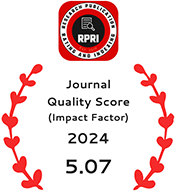Exploring the Influential Factors on Students' Mathematical Interest in Schools
DOI:
https://doi.org/10.55544/jrasb.2.3.10Keywords:
Mathematics, Interest, School, Khost, AfghanistanAbstract
This research study aimed to identify and examine the factors that influence the level of interest among high school students in mathematics education. The study explored various factors, including student characteristics, teacher attributes, government involvement, infrastructure challenges, instructional strategies, class size, and concerns related to mathematics. A central high school in Khost was selected as the research site. A random sampling technique was employed to select participants from each class, ensuring representation based on age and gender. The findings revealed that seven factors significantly predicted high school students’ interest in mathematics education. Specifically, the teacher factor, student factor, instructional strategy, math concern, and infrastructure problem positively correlated with the level of interest. At the same time, the class size and government involvement exhibited a negative association. These findings highlight the significance of these factors in shaping students' engagement with mathematics. Based on the results, it is recommended that the government implement regular professional development programs for mathematics teachers to enhance their instructional strategies, enabling them to nurture students' interest in mathematics education effectively.
Downloads
References
Anigbo, L. C., & Idigo, E. (2015). FACTORS AFFECTING STUDENTS' INTEREST IN MATHEMATICS IN SECONDARY SCHOOLS IN ENUGU STATE. Journal of Science & Computer Education, 3(3).
Anderson, L. B. (2013). Gifted Learners and Mathematical Achievement: An Analysis of Gifted Instructional Models (Doctoral dissertation, Liberty University).
Aud, S., Fox, M. A., & KewalRamani, A. (2010). Status and Trends in the Education of Racial and Ethnic Groups. NCES 2010-015. National Center for Education Statistics.
Bodovski, K., & Youn, M. J. (2012). Students’ Mathematics Learning from Kindergarten through 8th Grade. International Journal of Sociology of Education, 1(2), 97122.
Buck, L. (2009). The Motivational Effects of a GPS Mapping Project on Student Attitudes toward Mathematics and Mathematical Achievement (Doctoral dissertation, The University of Alabama TUSCALOOSA).
Eggen, P. & Kauchak, D. (2004). Educational Psychology. USA: Pearson Education, Inc.
Fry, R. (2007). How far behind in math and reading are English language learners? Washington, DC: Pew Hispanic Center.
Grigg, W., Donahue, P., & Dion, G. (2007). The Nation's Report Card [TM]: 12th Grade Reading and Mathematics, 2005. NCES 2007-468. National Center for Education Statistics.
Gutbezahl, J. (1995). How negative expectancies and attitudes undermine females' math confidence and performance: A literature review. ERIC Clearinghouse.
Hill, H. C., Rowan, B., & Ball, D. L.; Effects of teachers' mathematical knowledge for teaching on student achievement. American educational research journal, 42(2), 371–406.
Ketterlin-Geller, L. R., Chard, D. J., & Fien, H. (2008). Making connections in mathematics conceptual mathematics intervention for low-performing students. Remedial and Special Education, 29(1), 33-45.
Mickelson, R. A., & Bottia, M. (2009). Integrated education and mathematics outcomes: A synthesis of social science research.
NCL Rev., 88, 993. Murray, D. R. (2010). Irish-Medium Language Immersion Programs’ Effects on Mathematics Education. Journal of Mathematics Education at Teachers College, 1(2).
Ogena, E. B., Laña, R. D., & Sasota, R. S. (2010). Performance of Philippine High Schools with Special Science Curriculum In The 2008 Trends In International Mathematics And Science Study (Times-Advanced).
Quimbo, S. L. A. (2010). Explaining math and science achievement of public school children in the Philippines. Philippine Review of Economics, 40(2).
Riska, P. A. (2010). The Impact of SMART Board Technology on Growth in Mathematics Achievement of Gifted Learners (Doctoral dissertation, Liberty University).
Suan, J. S. (2014). Factors affecting underachievement in mathematics. Proceeding of the Global Summit on Education GSE, p. 5.
Downloads
Published
How to Cite
Issue
Section
License

This work is licensed under a Creative Commons Attribution-NonCommercial-NoDerivatives 4.0 International License.


















